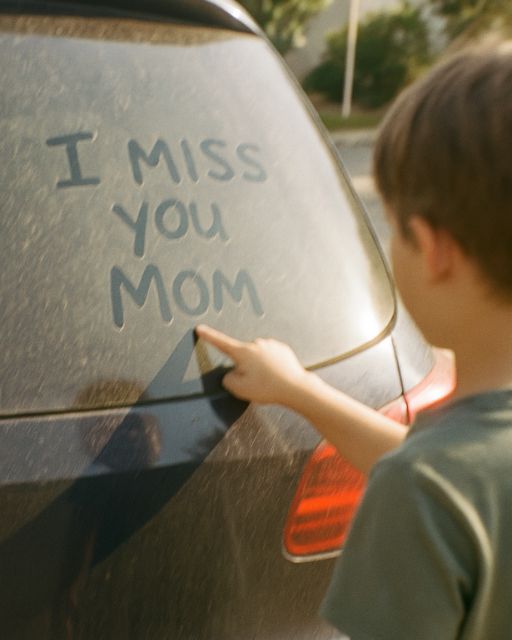It was just a car window.
Covered in dust, parked in the driveway like it hadn’t moved in months.
Probably hadn’t—since before everything changed.
I watched from the porch as he dragged his finger across the glass.
He didn’t know I was looking.
Didn’t see me clutch the coffee mug tighter when he started writing.
Three little words.
“I MISS YOU MOM.”
No spelling errors.
No backwards letters like when he used to write birthday cards.
Just straight and clear, like he’d been carrying it inside for a long time.
He stood there after, staring at the message like maybe—somehow—she’d see it.
Like maybe it would rise off the window and carry itself wherever she was.
I almost called out to him.
I almost said something comforting, something about how proud she’d be or how strong he was.
But I didn’t. He wasn’t writing it for me.
Then he did something I wasn’t ready for.
He leaned close to the glass, placed his palm beside the words, and whispered four more—
soft, careful, like he didn’t want the wind to hear.
“Was it my fault?”
Then he wiped away the last word in the sentence.
“MOM” disappeared under his hand.
Now the window just read:
“I MISS YOU.”
I set the coffee down without drinking.
Walked out slowly, footsteps heavy on the gravel.
Not wanting to scare him. Not wanting to intrude.
He didn’t look at me.
Didn’t flinch.
Just kept his hand on the glass, like the metal and dust were the only things holding him up.
“No,” I said softly.
“It wasn’t.”
He didn’t ask how I knew what he said.
Didn’t need to.
Because when guilt settles into a child’s bones, it doesn’t make a sound.
But it changes everything.
He turned to me finally—eyes glassy but dry—and nodded.
We sat on the front step for a while after that.
No words. Just the quiet creak of the wind chimes and the weight of memories we were both trying to carry.
I told him about the time his mom once danced barefoot in the kitchen with a spatula in her hand and flour on her face.
Told him how she used to hum when she folded laundry.
How she laughed loud at her own jokes and cried at dog commercials.
He listened.
Eyes fixed on the sky, like he was trying to line each story up with the stars.
Then he asked,
“Do you think she knows I still talk to her?”
I said,
“I think she never stopped listening.”
The twist?
A few weeks later, I went out to check the mail and saw something new on the car window.
He’d written again.
But this time, the message was different.
Four new words.
“I’m doing okay now.”
And underneath that, in smaller letters:
“Thanks for staying.”
He still writes sometimes.
Not every day. Not like before.
But when the grief starts creeping in, he finds the nearest window or dusty mirror and sends a message out to her.
He doesn’t wait for a reply.
He just lets it go.
And that’s how I know he’s healing.
Here’s what I’ve learned:
Sometimes the people who seem quiet are carrying the heaviest stories.
And sometimes, the simplest things—a dusty car window, a whispered sentence—can be the first step to letting go of a question that’s haunted someone for too long.
Grief doesn’t follow rules.
It writes its own letters in dust.
And sometimes, healing means letting the wind carry your words—just in case someone out there is still listening.
If this story touched something in you, share it. Like it if you believe kids shouldn’t have to carry questions like “Was it my fault?” And if you see a message written in dust— maybe don’t wipe it away. Someone needed it to be seen.




